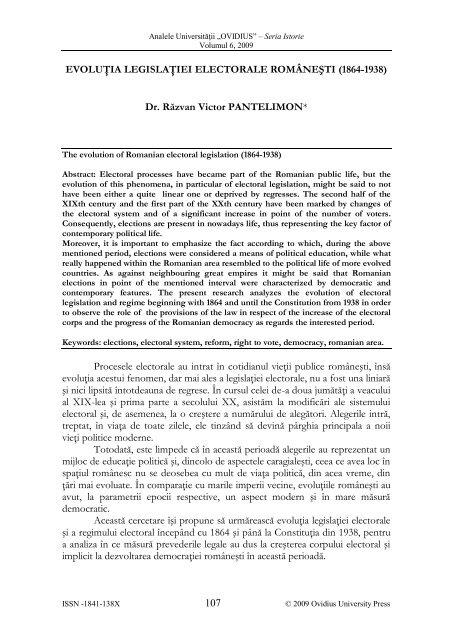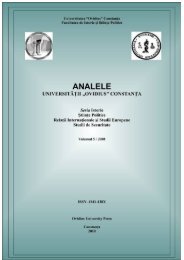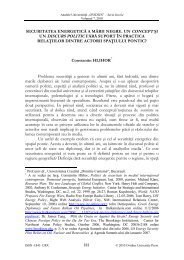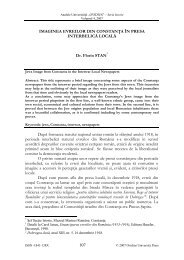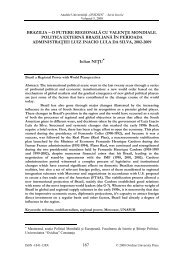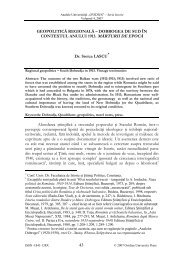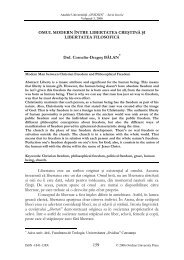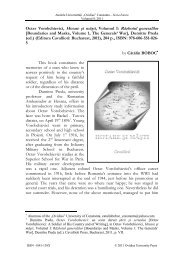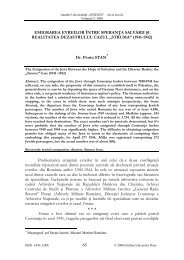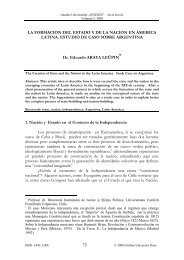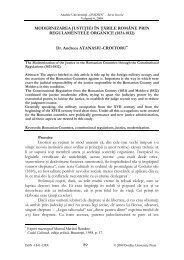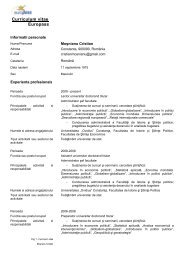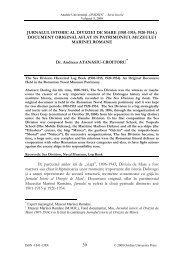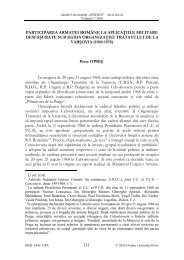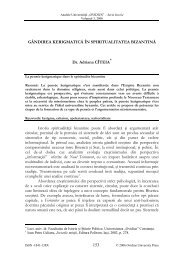analele universitÄÅ£ii âovidiusâ constanÅ£a - AUOCSI
analele universitÄÅ£ii âovidiusâ constanÅ£a - AUOCSI
analele universitÄÅ£ii âovidiusâ constanÅ£a - AUOCSI
You also want an ePaper? Increase the reach of your titles
YUMPU automatically turns print PDFs into web optimized ePapers that Google loves.
Analele Universităţii „OVIDIUS” – Seria Istorie<br />
Volumul 6, 2009<br />
EVOLUŢIA LEGISLAŢIEI ELECTORALE ROMÂNEŞTI (1864-1938)<br />
Dr. Răzvan Victor PANTELIMON*<br />
The evolution of Romanian electoral legislation (1864-1938)<br />
Abstract: Electoral processes have became part of the Romanian public life, but the<br />
evolution of this phenomena, in particular of electoral legislation, might be said to not<br />
have been either a quite linear one or deprived by regresses. The second half of the<br />
XIXth century and the first part of the XXth century have been marked by changes of<br />
the electoral system and of a significant increase in point of the number of voters.<br />
Consequently, elections are present in nowadays life, thus representing the key factor of<br />
contemporary political life.<br />
Moreover, it is important to emphasize the fact according to which, during the above<br />
mentioned period, elections were considered a means of political education, while what<br />
really happened within the Romanian area resembled to the political life of more evolved<br />
countries. As against neighbouring great empires it might be said that Romanian<br />
elections in point of the mentioned interval were characterized by democratic and<br />
contemporary features. The present research analyzes the evolution of electoral<br />
legislation and regime beginning with 1864 and until the Constitution from 1938 in order<br />
to observe the role of the provisions of the law in respect of the increase of the electoral<br />
corps and the progress of the Romanian democracy as regards the interested period.<br />
Keywords: elections, electoral system, reform, right to vote, democracy, romanian area.<br />
Procesele electorale au intrat în cotidianul vieţii publice româneşti, însă<br />
evoluţia acestui fenomen, dar mai ales a legislaţiei electorale, nu a fost una liniară<br />
şi nici lipsită întotdeauna de regrese. În cursul celei de-a doua jumătăţi a veacului<br />
al XIX-lea şi prima parte a secolului XX, asistăm la modificări ale sistemului<br />
electoral şi, de asemenea, la o creştere a numărului de alegători. Alegerile intră,<br />
treptat, în viaţa de toate zilele, ele tinzând să devină pârghia principala a noii<br />
vieţi politice moderne.<br />
Totodată, este limpede că în această perioadă alegerile au reprezentat un<br />
mijloc de educaţie politică şi, dincolo de aspectele caragialeşti, ceea ce avea loc în<br />
spaţiul românesc nu se deosebea cu mult de viaţa politică, din acea vreme, din<br />
ţări mai evoluate. În comparaţie cu marile imperii vecine, evoluţiile româneşti au<br />
avut, la parametrii epocii respective, un aspect modern şi în mare măsură<br />
democratic.<br />
Această cercetare îşi propune să urmărească evoluţia legislaţiei electorale<br />
şi a regimului electoral începând cu 1864 şi până la Constituţia din 1938, pentru<br />
a analiza în ce măsură prevederile legale au dus la creşterea corpului electoral şi<br />
implicit la dezvoltarea democraţiei româneşti în această perioadă.<br />
ISSN -1841-138X 107 © 2009 Ovidius University Press


